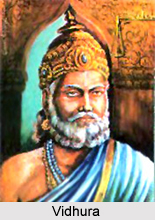 Vidhura was the son of a maid-servant who served the Queens of Hastinapur, Queen Ambika and Ambalika. In fact it is believed that Vidhura was a re-incarnation of Lord Yama and was brought down to earth due to a curse bestowed upon him by a learned sage named Mandavya. Vidhura was an intelligent man who was the bulwark of the Kuru dynasty.
Vidhura was the son of a maid-servant who served the Queens of Hastinapur, Queen Ambika and Ambalika. In fact it is believed that Vidhura was a re-incarnation of Lord Yama and was brought down to earth due to a curse bestowed upon him by a learned sage named Mandavya. Vidhura was an intelligent man who was the bulwark of the Kuru dynasty.
His Birth
The queens Ambika and Ambalika were married to King Vichitravirya of Hastinapur, who died childless. Vichitravirya`s mother Satyavati, who needed to ensure that the line was carried on, called upon her first son Vyasa, to bless the two queens with children through his special powers. He agreed to his mother`s wish. Vyasa being a hermit looked repelling to the eyes of the royal people.
Hence when he went to Ambika, she closed her eyes on seeing him, thus giving birth to a blind child. Similarly when he went to Ambalika she turned pale and gave birth to a child who was to suffer from leukemia in the coming years. When the queens were asked to go to the sage again, to ensure that there would be healthy children born, they refused and sent their maid-servant instead.
The maid-servant was not frightened at all and was strong. Hence her son was not born flawed like his half-brothers. Thus, Vidhura was born who was raised as brother of Dhritarashtra and Pandu.
The curse of re-incarnation
Vidhura`s birth was an exemplary instance of the fact that no one is above justice not even Lord Yama- the Dharmaraja (king of justice). As mentioned above, Lord Yama was born on earth as Vidhura. There is a small story attached to the reason why Lord Yama had to take birth on earth.
The story states that long ago, there was a renowned Sage named Mandavya who would spend his time practicing austerities and following the path of truth. One day, as he was immersed in silent meditation, a gang of bandits ran into his hermitage. They were being chased by a king`s security guards for having stolen some precious possession from the king`s palace. The bandits conveniently hid their booty in the sage`s hut and also hid themselves therein.
Mandavya, deep in meditation, was oblivious of what had happened, so much so that he did not even hear the interrogation of the commander of the royal team. Annoyed, the security team went into the sage`s hut only to discover the plundered goods. The commander concluded that the sage was not only an impostor but also the leader of the robbers, and on return, reported to the king what they thought was true.
The king, carried away with anger, ordered his commander to stab the man, who he thought was the chieftain of the bandits, without verifying the facts. The commander acted as instructed, returned with the stolen goods and handed them back at the royal warehouse. Mandavya, though in an uncertain state, was still alive thanks to the powers of yoga and meditation. Meanwhile, other sages gathered around and the word spread. When the king learnt about it, he ordered his guards to stop punishing him. Filled with guilt, the king went and prostrated before the sage.
Ignoring the king`s mistake, the rishi went and met lord Dharma. He asked the lord what sin he had committed to be inflicted with the punishment that he had undergone. Dharma, the dispenser of justice, failed to come up with a satisfactory explanation to vindicate the severity of the punishment. Therefore, sage Mandavya uttered a curse on Dharma that the latter need to go through a life cycle in the mortal world. Lord Dharma was thus born to the maidservant of Ambika, Ambalika and was named Vidhura.
His contribution to Kuru dynasty
As he did not belong to the royal blood, he was never considered or had any chance of obtaining the throne of the kingdom. He remained a brother to the princes and served them both as Prime Minister.
If after Krishna there was any trusted adviser to the Pandavas then it was Vidhura. He would regularly keep the Pandavas informed about the Kauravas plans and actions. He also warned the Pandavas about Duryodhana`s plan to burn them alive in a house of wax he had made for them. He was well known for saying the bitter truth to everyone and to be extremely intelligent in all fields.
After the great battle, he helped Yudhishtira when he became ruler. Later, he accompanied his brother Dhritarashtra, and his sisters-in-law Gandhari, and Kunti, on their last journey to the forest. He died before his companions, on the banks of the Ganga.












